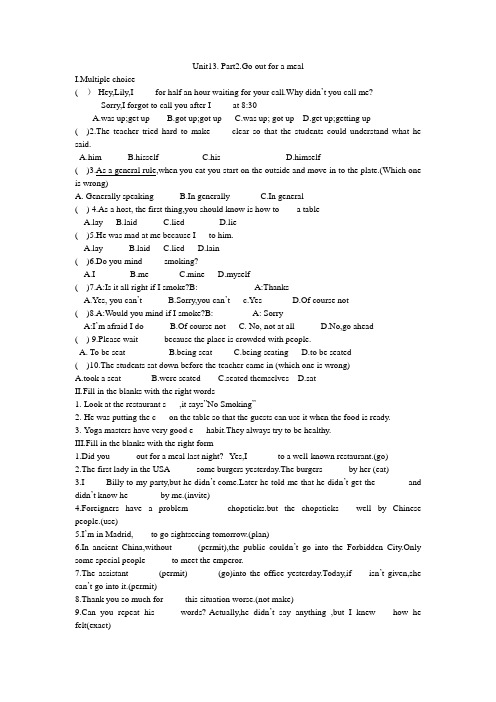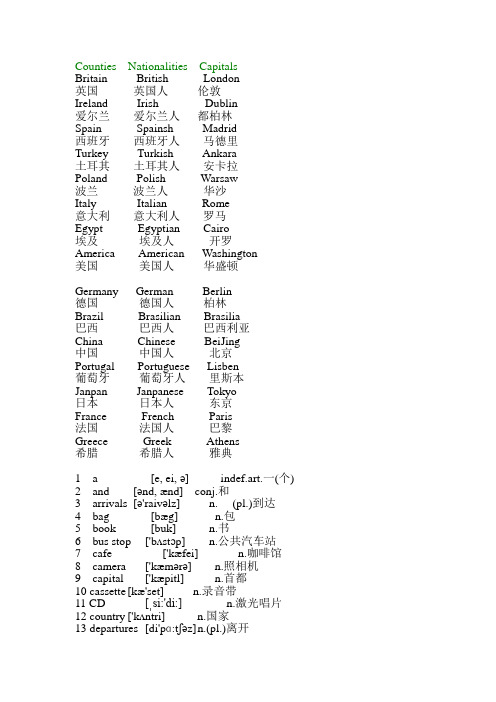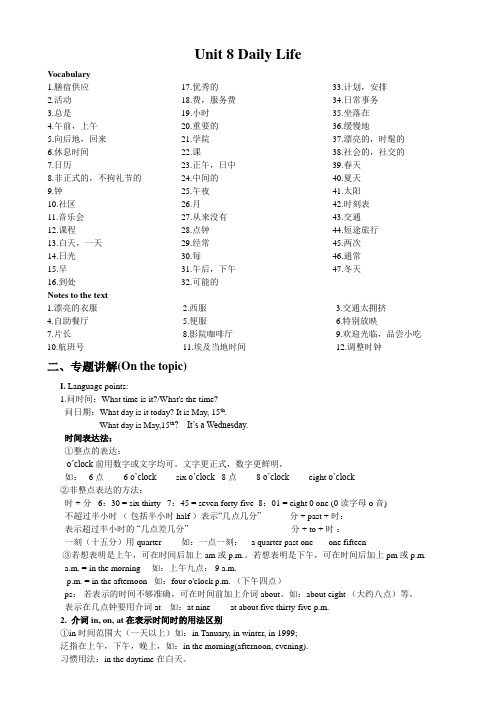展望未来1 第13单元知识点详细总结
九年级13单元知识点总结

九年级13单元知识点总结九年级是学生中学生涯的最后一年,同时也是中考前的关键一年。
在这一年里,学生需要对所学的知识进行巩固和总结,以便在中考中取得良好的成绩。
本文将对九年级13个单元的知识点进行总结与归纳,帮助学生们更好地复习备考。
第一单元:英语动词的时态与语态在这个单元里,我们学习了动词的基本形式、一般现在时、一般过去时、一般将来时等各种时态的用法。
同时,我们还学习了主动语态和被动语态的区别以及各种时态的被动语态形式。
这些知识点在英语学习中非常重要,掌握好它们能够有效地提高我们的语言表达能力。
第二单元:英语名词的数与格名词的数与格是英语中的重要知识点之一。
在这个单元里,我们学习了名词的单数和复数形式的变化规则,以及名词所有格的用法。
掌握这些知识点,能够帮助我们准确地表达事物的数量以及所属关系。
第三单元:英语形容词与副词形容词和副词是英语中修饰词的重要组成部分。
在这个单元里,我们学习了形容词和副词的基本用法,以及比较级和最高级的构成方法。
同时,我们还学习了一些常用的形容词和副词,以丰富我们的词汇量,并能够更准确地描述事物或行为。
第四单元:英语代词的使用代词是英语中常用的词类之一,它可以替代名词的作用。
在这个单元里,我们学习了人称代词、物主代词、反身代词等的用法。
同时,我们还学习了一些特殊的代词,如不定代词和相互代词等。
掌握好这些知识点,能够使我们的语言表达更加简洁和准确。
第五单元:英语动词的非谓语形式在这个单元里,我们学习了动词的非谓语形式包括动词不定式、动名词和现在分词。
学习这些非谓语形式的用法能够帮助我们更好地理解和运用复杂的句子结构。
第六单元:英语情态动词情态动词是英语中常用的一类动词。
在这个单元里,我们学习了情态动词的基本用法,包括情态动词的情态、语气和时态。
同时,我们还学习了情态动词与其他动词的构成方法以及与其他词类的搭配规则。
掌握好情态动词的用法,对我们准确表达意思和加强语气具有重要的作用。
展望未来第一册Unit13

Unit13. Part2.Go out for a mealI.Multiple choice( )-Hey,Lily,I_____for half an hour waiting for your call.Why didn’t you call me?---Sorry,I forgot to call you after I_____at 8:30A.was up;get upB.got up;got upC.was up; got upD.get up;getting up( )2.The teacher tried hard to make_____clear so that the students could understand what he said.A.himB.hisselfC.hisD.himself( )3.As a general rule,when you eat you start on the outside and move in to the plate.(Which one is wrong)A.Generally speakingB.In generallyC.In general( ) 4.As a host, the first thing,you should know is how to ___ a tableyidC.liedD.lie( )5.He was mad at me because I___to him.yidC.liedin( )6.Do you mind_____smoking?A.IB.meC.mineD.myself( )7.A:Is it all right if I smoke?B:_____________A:ThanksA.Yes, you can’tB.Sorry,you can’t c.Yes D.Of course not( )8.A:Would you mind if I smoke?B:_________A: SorryA:I’m afraid I do B.Of course not C. No, not at all D.No,go ahead( ) 9.Please wait______because the place is crowded with people.A. To be seatB.being seatC.being seatingD.to be seated( )10.The students sat down before the teacher came in (which one is wrong)A.took a seatB.were seatedC.seated themselvesD.satII.Fill in the blanks with the right words1.Look at the restaurant s___,it says”No Smoking”2.He was putting the c___on the table so that the guests can use it when the food is ready.3.Yoga masters have very good e___habit.They always try to be healthy.III.Fill in the blanks with the right form1.Did you______out for a meal last night?--Yes,I_______to a well-known restaurant.(go)2.The first lady in the USA______some burgers yesterday.The burgers______by her (eat)3.I_____Billy to my party,but he didn’t ter he told me that he didn’t get the _______and didn’t know he _______by me.(invite)4.Foreigners have a problem_________chopsticks.but the chopsticks____well by Chinese people.(use)5.I’m in Madrid,____to go sightseeing tomorrow.(plan)6.In ancient China,without______(permit),the public couldn’t go into the Forbidden City.Only some special people______to meet the emperor.7.The assistant_______(permit)_______(go)into the office yesterday.Today,if____isn’t given,she can’t go into it.(permit)8.Thank you so much for_____this situation worse.(not make)9.Can you repeat his______words?-Actually,he didn’t say anything ,but I knew____how he felt(exact)10.---Look at these two women.It’s quite_____one of them is more beautiful.---Yes,I can see that_____(clear)11.Do you mind_____(sit)here?IV.Error1.The man usually takes wine for a present.I don’t think wine is a good gift.2.My mother hopes me to know me deskmate well.3.Neither he nor I were in bed at 11:00 last night.V.Fill in the blanks with the correction preposition1.Put forks____the right and knives and soup spoons_____the left.2.Different knives and forks are______the different courses3..The couple sometimes go out____a meal.4.Can you arrive here____time tomorrow?This morning,you were late____the meeting.5.Could you please wait___me for a minute?6.When you stand___-the top of a mountain,you feel that you can do eveything.7.There are a lot of houses_____the bottom of the mountain.VI.Pattern shift1.Marco asked Maggie about eating at people’s homes in Britain.(passive voice)2.I waited to be seated for an hour yesterday.(raise a question)3.Don’t forget your mistakes”Mr wang said to me.(combine 2 into 1)4.We think he can smoke in the house.(raise a question)5.I found that people in Spain are very different from British people(simple sentence)I found_____ ____ ______ _____ ______ ______from British people.6.Do you mind if I sit here?(complex sentence--simple sentence)7.Going out for a meal is a great idea for us to relax.(emphetic sentence)8.I’m having a few problems with the eating habits.(raise a question)9.I’ll set off some fireworks this afternoon(passive voice)。
《展望未来》第一册13单元复习Unit 13

Revision of Unit 13 Book 2Vocabulary:Paper A1. loss n.2. team n.3. work outPaper B1. damage v.2. flood n.3. homeless4. briefcase n.5. break-in6. appointment n.7. emotional adj. (emotion n.=feeling) 8. legal adj. (_______ ant.adj.) 9. calm v.10. connect v. 11. loneliness n. (_____ adj. _____ adj./adv.)12. upset adj. 13. behavio(u)r n. (_____ v.) 14. arrest v./n.15. financial adj. 16. counselor n. 17. fail v.18. follow v. 19. unbelievable adj. 20. burn v.(burnt,~)21. bomb n 22. once conj. 23. major adj./ v.24. wrap v. (-pp-) 25. storm n. 26. identification n.27. fire brigade n. 28. firefighter n. 29. belong v.30. enter v.=____ ___ ______ _____Language points1.homeless adj. (n.+less = adj.) 没有…的eg. careless, treeless, hopeless, worthless….2.go + adj. = become/get + adj. eg. go bold, go blind…e up to sth. 达到The water came up to my neck.4.fill…with… e.g Please fill this bottle with lemonade.be filled with =___ _____ ____ eg. This basket is filled with eggs.=This basket is full of eggs.be full of (people) = be crowded with (people) eg. This office is full of students.=This office is crowded with students.5.make / keep / break an appointment with sb.6.go back to sp.=_____ ____ ______7.There was a break-in at the bank.8.live a long way from = live ____ away from; live near sp. = live close to sp.Eg. She lives a long way from her company.9.work out: eg. Finally, I worked out that difficult question.work as / for / at / in / on10.connect …with / to ….be connected with = have something to do witheg. This man is connected with that murder. = This man has something to do with that murder.11.behavior n. eg. He got a prize because of his good behavior at school.behave v. eg. He got a prize because he behaved well at school.well / badly-________ adj. eg. He got a prize because he was ____________ at school.12.in a low/ weak/ high/ strong voice; at the top of one‟s voice = shout at sb.13.arrest v. ~ sb. The police have arrested that terrible murderer.be under arrest = ___ ___________14.calm down = _____ _______ calm sb. eg. A warm bath will calm you.15.fail v. fail ______ (do); fail ____ sth. eg. I failed to pass the history exam.failure n. eg. Failure is the mother of success.succeed v. succeed in sth./ in doing sth.______________ n. ________ adj. _____________adv.16.in fact = _______17.be on duty------be off duty18.follow v. eg. I was walking in the street, _________ by an old lady.An old lady was walking in the street, _________ me.19.major adj. eg. a major fire; a major accidentv. major in + 科目eg. He majored in physics at university.20.once conj.= as soon as Once he ________ (know) her information, he _________ (call) you.= As soon as he ________ her information, he ________ you.21.entry n. make an entry into sp. = enter (v.) sp.22.believe v. _____________ adj_______________ (ant. adj.) belief n. (beliefs pl.)23.wrap sth. in sth. ; be wrapped by/ in eg. The present is wrapped by a piece of pretty paper.wrapper n.24.belong to eg. This cap isn‟t yours. It belongs to me.25.It‟s kind/ friendly/ nice…____ sb. to do sth.It‟s difficult/ easy/ impossible… ____ sb. to do sth.26.a sort of =__ _____ ____27. be upset _____sth28. be responsible for sth/sb = have _____________ ____ sth/sbWord transformation1. loneliness n. --lonely adj.-- alone adj./adv2.enter v.—entrance n.—entry n.3.responsible adj—responsibility n4. wrap v.-- wrapper n.5. fail v—failure n.6.succeed v—successful adj—success n.—successfully adv7. believe v.—believable adj.—unbelievable adjGrammar: Change the direct speech into the indirect speech.(直接引语变间接引语)1.时态变化。
展望未来第13单元说课PPT课件

3. Moral objects
➢ Not pocket the money one picks up (拾金不昧) ➢ Don’t change what others said randomly.
2021/3/12
7
Teaching important and difficult points
2021/3/12
5
Teaching Objectives
1. Knowledge objects
➢ Words: client, briefcase, cheque book, papers, appointment book
➢ Phrase: be with somebody ➢ Grammar: to change direct speech to indirect
本节课是听说课,听力材料围绕“公文包遗失、开会迟到 ”
而展开。听力材料中包括“直接引语与间接引语”,这是 初
中英语课程标准要求的语法项目之一。本节课学生首次学
习此语法项目,通过本课学习,为后面进一步学习“直接
2021/3/12
3
引语与间接引语”打下基础。
Status and Function
➢ The conversation happens between Julia and Tom. Julia explained to Tom that she lost her briefcase in which there were some important things, and she went to the police station, so she was late for the meeting.
展望未来第一册第一单元总结

Counties Nationalities CapitalsBritain British London英国英国人伦敦Ireland Irish Dublin爱尔兰爱尔兰人都柏林Spain Spainsh Madrid西班牙西班牙人马德里Turkey Turkish Ankara土耳其土耳其人安卡拉Poland Polish Warsaw波兰波兰人华沙Italy Italian Rome意大利意大利人罗马Egypt Egyptian Cairo埃及埃及人开罗America American Washington美国美国人华盛顿Germany German Berlin德国德国人柏林Brazil Brasilian Brasilia巴西巴西人巴西利亚China Chinese BeiJing中国中国人北京Portugal Portuguese Lisben葡萄牙葡萄牙人里斯本Janpan Janpanese Tokyo日本日本人东京France French Paris法国法国人巴黎Greece Greek Athens希腊希腊人雅典1 a [e, ei, ə] indef.art.一(个)2 and [ənd, ænd] conj.和3 arrivals [ə'raivəlz] n. (pl.)到达4 bag [bæg] n.包5 book [buk] n.书6 bus stop ['bʌstɔp] n.公共汽车站7 cafe ['kæfei] n.咖啡馆8 camera ['kæmərə] n.照相机9 capital ['kæpitl] n.首都10 cassette [kæ'set] n.录音带11 CD [ˌsi:'di:]n.激光唱片12 country ['kʌntri] n.国家13 departures [di'pɑ:tʃəz] n.(pl.)离开14 diary ['daiəri] n.日记(本)15 dollar ['dɔlə] n.美元16 double ['dʌbəl] a.双17 European Community(缩写EC)['jurəˌpiən kɔ'mju:nəti] 欧洲共同体18 facility [fə'siliti] n.设备;设施19 family ['fæməli] n.家;家庭20 flight [flait] n.飞行21 from [frəm,frɔm] prep.从22 gate [geit] n.大门23 good [gud] a.好的24 goodbye [ˌgud'bai]n.再见25 guidebook ['gaidbuk] n.指南26 hello [hə'ləu] n.喂27 hi [hai] interj. 嘿28 how m uch? 多少29 I [ai] pron.我30 in [in] prep.在31information [ˌinfə'meiʃən] n.信息32international [ˌintə'næʃənəl]国际的33 it [it] pron.它34 jazz [dʒæz] n.爵士乐35 map [mæp] n.地图36 meal [mi:l] n.一餐37 minute ['minit] n.分钟38 morning ['mɔ:niŋ]n.早上;上午39 Mr ['mistə] 先生40 My [mai] 我的41 name ['neim] n.名字42 nationality[ˌnæʃə'næliti] n.国籍43 nightclub ['naitklʌb] n.夜总会44 no [nəu] ad.不45 number ['nʌmbə] n.数字46 passport ['pɑ:spɔ:t] n.护照47 pen [pen] n.笔;钢笔48 please [pli:z] interj.请49 postcard ['pəustkɑ:d] n.明信片50 pound [paund] n.英镑51 price [prais] n.价格52 private ['praivit] a.私人的53 right [rait] ad.对54 room [ru:m] n.房间55 single ['siŋgəl] a.单个的56 sorry ['sɔri] interj.对不起57 souvenir [ˌsu:və'niə] n.纪念品58 thanks [θæŋks]interj.谢谢59 thank you['θæŋkju:] interj.谢谢你60 the [ðə, ði] art.这(些)那(些);61 there [ðeə] ad.那里62 this [ðis] pron.这个63 to [tu:, tu] prep.向;往;到64 tourist office ['tuəristˌɔfis]旅游服务处65 video cassette['vidiəukəˌset]n.录像带66 welcome ['welkəm] v.欢迎67 what [wɔt, wɑ:t] pron.什么68 where [weə] ad.哪里69 yes [jes] ad.是的70 you [ju, ju:] pron.你;你们71 your [ jɔ:, jɔ:r] 你/你们的1 address [ə'dres] n.地址2 an [ən, æn] art.一;一个3 at [æt] prep.在4 boss [bɔs] n.老板;上司5 company ['kʌmpəni] n.公司6 county ['kaunti] n.城镇7 earn [ə:n] v.赚得;挣得8 envelope ['envələup] n.信封9 everyone ['evriwʌn] n.每个人10 first name [fə:st ˌneim] n.名11 for [fə, fɔ:] prep.为了12 form [fɔ:m] n.表格;形式13 he [hi:] pron.他14 her [hə:] pron.(宾格)她;她的15 his [hiz] pron.他的;他的东西16 how [hau] ad.如何;怎样17 job [dʒɔb] n.职业;工作18 letter ['letə] n.信19 marital status [ˌmæritl'steitəs] n.婚姻状况20 medicine ['medsən] n.药21 not [nɔt] ad.不22 patient ['peiʃənt] n.病人23 person ['pə:sn] n.人24 people ['pi:pl] n.人25 personal ['pə:sənəl] a.个人的26 picture ['piktʃə] n.图画27 postcode ['pəustkəud] n.邮政编码28 road [rəud] n.道路29 salary ['sæləri] n.薪水30 she [ʃi:, ʃi] pron.她31 street [stri:t] n.街道32 surname ['sə:neim] n.姓33 taxi driver ['tæksi ˌdraivə] n.出租汽车司机34 today [tə'dei] ad./n.今天35 too [tu:] ad.也36 town [taun] n.镇;市镇;市区37 very ['veri] ad.很;非常38 week [wi:k] n.星期;周。
(完整版)人教版九年级英语第十三单元知识点总结

(完整版)人教版九年级英语第十三单元知识点总结(word版可编辑修改)编辑整理:尊敬的读者朋友们:这里是精品文档编辑中心,本文档内容是由我和我的同事精心编辑整理后发布的,发布之前我们对文中内容进行仔细校对,但是难免会有疏漏的地方,但是任然希望((完整版)人教版九年级英语第十三单元知识点总结(word版可编辑修改))的内容能够给您的工作和学习带来便利。
同时也真诚的希望收到您的建议和反馈,这将是我们进步的源泉,前进的动力。
本文可编辑可修改,如果觉得对您有帮助请收藏以便随时查阅,最后祝您生活愉快业绩进步,以下为(完整版)人教版九年级英语第十三单元知识点总结(word版可编辑修改)的全部内容。
② He is always helping others.他总是帮助别人。
(他真是个好人)4)对于come, go, leave, arrive, start,fly,drive等表示位置移动的动词常可用进行时态表将来。
①He is leaving on Wednesday。
②Mary isn't here at the moment。
She is coming later。
2. used to do见第四单元及use用法3. 被动语态见第五单元注意:接双宾语的词的被动语态;make /let /have sb do的被动语态;see/ hear /notice /find /observe sb do 的被动语态;It’s said/reported/believed/supposed/well-known;及无被动语态的三种情况(感官动词、不及物动词、sell/write等)4. 现在完成时:用法:①过去发生的动作对现在造成的影响或结果:强调结果Yesterday I finished my homework,that’s to say, I have finished my homework now。
展望未来1-Unit8重要知识点概要

Unit 8 Daily Life Vocabulary1.膳宿供应2.活动3.总是4.午前,上午5.向后地,回来6.休息时间7.日历8.非正式的,不拘礼节的9.钟10.社区11.音乐会12.课程13.白天,一天14.日光15.早16.到处17.优秀的18.费,服务费19.小时20.重要的21.学院22.课23.正午,日中24.中间的25.午夜26.月27.从来没有28.点钟29.经常30.每31.午后,下午32.可能的33.计划,安排34.日常事务35.坐落在36.缓慢地37.漂亮的,时髦的38.社会的,社交的39.春天40.夏天41.太阳42.时刻表43.交通44.短途旅行45.两次46.通常47.冬天Notes to the text1.漂亮的衣服2.西服3.交通太拥挤4.自助餐厅5.便服6.特别放映7.片长8.影院咖啡厅9.欢迎光临,品尝小吃10.航班号11.埃及当地时间12.调整时钟二、专题讲解(On the topic)I. Language points:1.问时间:What time is it?/What's the time?问日期:What day is it today? It is May, 15th.What day is May,15th? It’s a Wednesday.时间表达法:①整点的表达:o’clock前用数字或文字均可。
文字更正式,数字更鲜明,如: 6点------ 6 o’clock ------six o’clock 8点------ 8 o’clock ------eight o’clock②非整点表达的方法:时 + 分 6:30 = six thirty 7:45 = seven forty-five 8:01 = eight 0 one (0 读字母o 音)不超过半小时(包括半小时half )表示“几点几分”分 + past + 时:表示超过半小时的“几点差几分”分 + to + 时:一刻(十五分)用quarter 如:一点一刻: a quarter past one one fifteen③若想表明是上午,可在时间后加上am或p.m.。
九年级十三单元重要知识点

九年级十三单元重要知识点一、地理1. 内容一:自然灾害自然灾害是指由自然力量引起的对人类社会造成巨大伤害的灾害事件。
主要包括地震、洪水、台风、干旱等。
这些灾害不仅对人们的生命财产造成威胁,还会对社会经济发展带来严重影响。
因此,我们应该加强对自然灾害的防范和应对能力。
2. 内容二:人口与城市人口与城市是地理学中一个重要的研究领域。
随着经济社会的发展,人口不断向城市集聚,城市的规模也越来越大。
这给城市带来了许多挑战和机遇。
人口与城市的关系密切相关,人口数量、结构、流动等因素都会对城市发展产生影响。
3. 内容三:资源与环境资源是指人类可以利用的自然物质、能源和信息等。
而环境则是人类生存和发展的基础。
资源与环境的关系紧密相连,合理利用资源、保护环境是可持续发展的重要基础。
在资源有限的情况下,我们需要加强对资源的保护和合理利用,以实现经济社会的可持续发展。
二、物理1. 内容一:力和运动力是物体之间相互作用的结果,它使物体发生运动或改变运动状态。
运动是物体在空间中位置或状态的改变。
力和运动是物理学中最基本的概念之一,研究它们的规律对理解物质世界的运动规律具有重要意义。
2. 内容二:光的传播光是电磁波的一种,具有波粒二象性。
光的传播可以通过直线传播和折射传播等方式实现。
光的传播规律对于理解光的行为和应用具有重要意义,如光的反射、折射、色散等现象都是基于光的传播规律。
3. 内容三:热热是物体内能的一种形式,是物质微观粒子之间相互作用的结果。
热可以传递、传导、辐射等方式,热的传播规律不仅涉及到物质的热传导性质,还与能量的守恒等基本原理有关。
三、化学1. 内容一:化学方程式化学方程式是描述化学反应过程的表达式,由反应物、生成物和反应条件组成。
通过化学方程式,可以定量说明反应物与生成物之间的摩尔比例关系。
化学方程式的平衡是指在一定的条件下,反应的物质在摩尔和质量上保持稳定的比例关系。
2. 内容二:化学反应速率化学反应速率是指单位时间内反应物和生成物之间的物质转化速率。
- 1、下载文档前请自行甄别文档内容的完整性,平台不提供额外的编辑、内容补充、找答案等附加服务。
- 2、"仅部分预览"的文档,不可在线预览部分如存在完整性等问题,可反馈申请退款(可完整预览的文档不适用该条件!)。
- 3、如文档侵犯您的权益,请联系客服反馈,我们会尽快为您处理(人工客服工作时间:9:00-18:30)。
Unit13 Part1Words1.invite .vt 邀请[ 过去式invited 过去分词invited 现在分词inviting ]eg. She invites me to her party. 她邀请我参加晚会。
be invited 被邀请eg. It’s a huge honour to be invited by Her Majesty to stay in Buckingham Palace.invitation. n eg. I get/got an invitation to her home 我得到去她家的邀请2.plan v. (planned,planning)计划,打算vi. plan to do stheg. Josie planned to work until she had saved enough money to go to nursing school. 乔茜打算先工作,等攒足了钱再去护士学校。
n. His plan is to get a degree in economics and then work abroad for a year.他的计划是取得一个经济学学位,然后去国外工作一年。
3.reply v.回答,答复;回应reply to a question 回答问题n.(+to) We’ve had 60 replies to our advertisement so far.到目前为止,我们已经收到60份对我们广告的回应。
4.accept.vt (1)接受;收受eg. accept an invitation 接受邀请accept a gift 收受礼物(2)承认;认可;赞成;同意eg. accept defeat 承认失败accept a theory 赞成某种理论(3)相信,认为正确eg. The idea is widely accepted. 这种观念已被广泛接受。
5.refuse v. 拒绝(做某事)refuse to do sthI refuse to take part in anything that’s illegal.我拒绝参与任何违法的事情。
Phrases1.invite sb to (sp):Who should we invite to the party? 我们应请谁来参加聚会?invite sb to do sth:I’m thinking of inviting them to spend the summer with me in Italy. 我正考虑邀请他们和我一起在意大利过夏天。
2.be busy with/doing sth:Mr Haynes is busy with a customer at the moment.海恩斯先生此时正忙着接待一位顾客。
Rachel’s busy studying for her exams.蕾切尔正忙于温习准备考试。
3.in the end=at last=finallyin the beginning=at firstat the end ofat the beginning of4.go for a walk 去散步5.hope to do:Joan’s hoping to study Law at Harvard. 琼盼望能到哈佛大学念法律。
hope that+clause:I hope you have a lovely birthday.我希望你能过一个快乐的生日。
6.wish sb sth 祝,祝愿(某人好运、幸福等) Wish me luck! 祝我走运吧!wish sb to do:(表示婉转的命令)请求,要求eg. I wish you to come at three o’clock. 我要你在三点钟来。
wish to do:希望;想要We wish to visit the new museum.我们很想去参观新博物馆。
7.a plan for sth:make a plan for increasing production 制定增产计划plan to to:eg. Josie planned to work until she had saved enough money to go to nursing school.乔茜打算先工作,等攒足了钱再去护士学校。
Functional language1、Would you like to come to the dinner? 你来吃晚饭好吗?would like 用来表示意愿、邀请,是一种比较礼貌的形式。
Would like 后面接动词不定式,即:to +动词原形。
例:Would you like to go by train?Would you like to sit in front of the TV (set)?Would you like to speak to the director?回答有两种形式:I’d love to. 或者I’d want to.(肯定)I don’t want to. (否定)Would like 与名词连用时,也是表示邀请。
例:Would you like a glass of beer?Would you like another cup of coffee?回答有两种形式:Yes, please.(肯定)No, thank you.(否定) 注意:在拒绝是也要道谢。
2、Would you tell me her address? 你告诉我她的地址好吗?Would you …? 可以用来表达请求。
与Could you …? 意思相同。
例:Would you give my mother the letter?Would you please pass me the salt?Could you give him the book, please?Could you please go shopping with me?3、Would you like to go out for a meal this evening?今晚出去吃顿饭好吗?for a meal 是介词短语,介词for用来表示目的。
例:We have a special room for parties.The child stayed near his mother for love.I haven’t got any plans for the weekend.4、Oh, well. Another time perhaps. 好吧,下次吧。
Oh, well.是感叹词,表示顺从的意思,作“那好吧”解。
Another time. “下回吧”5、How about tomorrow? 明天怎么样?How about相当于what about,他们后面接名词、代词、动名词等,常用于想对方提出建议或征求意见、征询看法。
例:How about going to market?How about some dessert?What about going swimming?6、Would you like some more chicken? 再吃些鸡好吗?I can’t eat any more.我再也吃不下了。
答句里面的more是名词,表示“另外的一些“。
回答有两种形式:Yes, please. It’s lovely.(肯定)No, thanks. It was lovely.(否定)例:Take some more please.any more是表示“再”的意思,通常和not连用。
例:I don’t want to see him any more.She couldn’t w alk any more so we took a taxi to the airport.7、Do you take a present?你带礼物去吗?Take,是“把…带住”的意思。
另外,bring是“把…带至说话人所在处或指定的地方”的意思。
例:I usually take my sister when there is a party in the company.Do you often take an umbrella with you when you go out?Could you bring Susan to our party?Please bring a lot of delicious food next time when you come here.Part2.go-went-gone(v) 去eat-ate-eaten(v) 吃eating time 用餐时间eating habits 用餐习惯go out for a meal=go out having a meal =eat out 外出用餐go to dinner 去吃晚餐take/took sb out to dinner: 带某人外出就餐(take-took-taken)eat at people’s homes: 在别人家用餐a knife and fork: 一套餐具knife-knives (n) 刀set-set-set; set/lay a/the table: 摆放餐具lay-laid-laid (v) 放置;摆放;下蛋;产卵lie-lied-lied (v)说谎lie-lay-lain(v) 躺,位于know sb well: 很了解某人know-knew-known (v)知道,了解a bottle of wine: 一瓶酒wine(n) 葡萄酒liquor(n) 烈性酒beer(n) 啤酒situation(n) 形式,局面political/economic situation 政治/经济形式glass (n) 杯子glasses glass (n)(u) 玻璃 a glass of 一杯…on the left/right: 在左边/右边top(n) 顶部at the top( of sth ): Write your name at the top of the page.在页面的上端写下你的名字。
bowl (n) 碗 a pair of chopsticks(n) 筷子chopstick rest (n) 筷子架on the menu:在菜单上in/on the bill 在账单上outside(prep) 在…外面inside 在…里面smoke(v) 吸烟fireworks(n)(pl) 烟花let off/set off 燃放Is it all right/Ok if I do sth : 我做…可以吗?——Yes, please.Do/Would you mind if I do sth?=Do/Would you mind my/me doing sth? 不介意我做某事吧?——Of course not.seat (v) 使…就坐,向…提供座位(n)座位have/take a seat=be seated=sit down(入座)=seat oneselfgo to bed =go to sleep 去睡觉be in bed:在床上: Simon lay in bed reading for hours. 西蒙躺在床上看了好几个小时的书。
